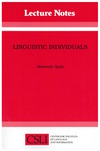Almerindo E. Ojeda
The goal of semantics is the insightful identification of the set of
meanings that human language can express- the construction of what has
been called the metaphysics of natural language. A formal attempt to
construct such a metaphysics has generally involved identifying a set
of individuals referred to as the universe of discourse. Until
recently, however, semanticists have had little to say about the
structure of this set.
Ojeda argues that the structure of the set of
linguistic individuals is a mereology, that is, the domain of
discourse is made up of kinds and the instantiations of kinds. His
argument forms the four main selections of this work. The first
examines the semantics of countability (countable stems, number
inflection, adjectives of measure, and determiners); the second
explores the semantics of uncountability (the individuation of
reference, and non-Boolean mass predicates); the third takes up the
semantics of nominality (the mereological homogeneity of nouns and the
constraints on nouns in classifier languages); and the last
investigates the semantics of the conceptional neuter, a pronominal
category discussed by Otto Jesperson.
Ojeda's investigations contribute to the characterization of linguistic individuals and
provide for a new basis for the semantics of individuation.
Almerindo E. Ojeda is a professor of linguistics at the University of California at Davis.
- Acknowledgements
- 1 Introduction
- 1 Introduction
- 2 Scope of the Inquiry
- 3 Overview of the Work
- 2 A Theory of Linguistic Individuals
- 1 Introduction
- 2 The Mereological Theory of Individuals
- 3 The Calculus of Kinds
- 3.1 Instantiation
- 3.2 Overlap
- 3.3 Disjointness
- 3.4 Proper Instantiation
- 3.5 Constitution
- 3.6 The Universal Kind
- 3.7 The Void Kind
- 3.8 Difference
- 3.9 Complementation
- 3.10 Atomicity
- 4 The Concept of a Kind
- 3 The Semantics of Countability I
- 1 Introduction
- 2 Countable Stems
- 3 Number Inflection
- 4 Countable Nouns
- 5 Singularity as Atomicity
- 6 Markedness and Plurality
- 7 Cumulative Relative
- 8 Semantic Parsimony
- 9 Cardinal Adjectives
- 10 Multal and Paucal Adjectives
- 11 Some Assumptions
- 12 Universal Determiners
- 13 Existential Determiners
- 14 Nonexistential Determiners
- 15 Dual Determiners
- 16 The Definite Article: Descriptive Uses
- 17 Syntactic Denotations
- 4 The Semantics of Countability II
- 1 Introduction
- 2 Countable Stems
- 3 Number Inflection
- 4 Countable Nouns
- 5 Singularity as Disjointedness
- 6 Markedness and Plurality
- 7 Cumulative Reference
- 8 Semantic Parsimony
- 9 Cardinal Adjectives
- 10 Multal and Paucal Adjectives
- 11 Some Assumptions
- 12 Universal Determiners
- 13 Existential Determiners
- 14 Nonexistential Determiners
- 15 Dual Determiners
- 16 The Definite Article: Generic Uses
- 17 More on Generic Uses
- 18 Syntactic Denotations
- 19 Genericity and Intensionality
- 5 The Semantics of Unconditionality
- 1 Introduction
- 2 Uncountable Stems
- 3 Secondarily Countable Stems
- 4 The Materialization Function
- 5 The Reversability of Countability
- 6 The Individuation of Reference
- 7 Some Comparisons
- 8 Number Inflection
- 9 Uncountable Nouns
- 10 Cumulative Reference
- 11 Distributive Reference
- 12 Cardinal Adjectives
- 13 The Measure of Kinds
- 14 Multal and Paucal Adjectives
- 15 Quantifiers
- 16 Multal, Paucal, and Cardinal Noun Phrases
- 17 The Quasiuniversal Quantifier
- 18 The Definite Article
- 19 On the Protean Nature of Mass Nouns
- 20 Uncountability and Intensionality
- 21 Complex Predicates
- 22 Uncountability and Plurality
- 6 On the Semantic Character of Nouns
- 1 Introduction
- 2 Nominality as Homomericity
- 3 Some Apparent Exceptions
- 4 Nominality as Atomlessness: Classifier Language
- 7 On the Conceptual Neutrality
- 1 Introduction
- 2 The Spanish Forms
- 3 A Formal Account of the Spanish Forms
- 3.1 General Remarks
- 3.2 Stressed Personal Pronouns
- 3.3 Unstressed Personal Pronouns
- 3.4 Demonstrative Pronouns
- 3.5 Existential Pronouns
- 3.6 Nonexistential Pronouns
- 4 Conceptual Neuterality: A Synthesis
- Appendix A: The Boolean Theory of Individuals
- Appendix B: On the Construction of Bells
- References
- Index of Names
- Index of Languages
1993


